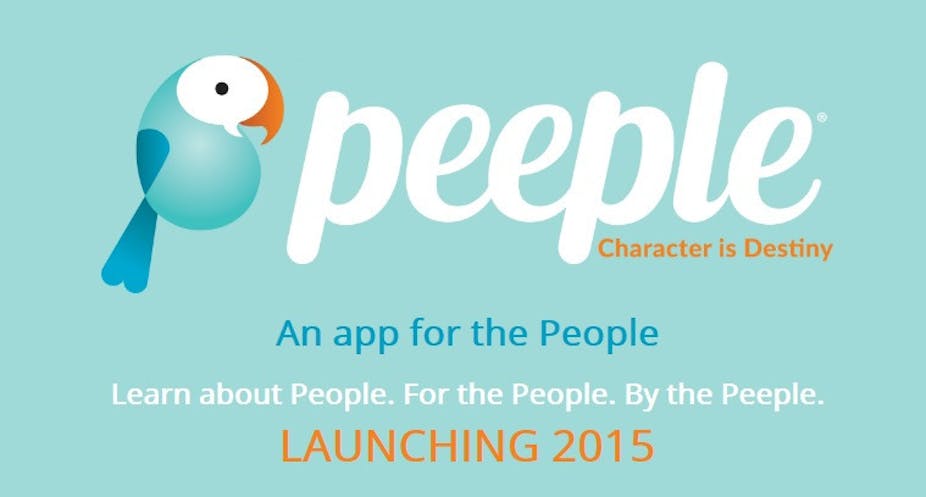Never shy of publicity or fearful of controversy, Silicon Valley’s app entrepreneur scene seems on course to establish a new low in ethical values and/or self-delusional thinking with the planned launch of the Peeple app – described as “Yelp for people”.
Having reportedly raised US$7.6m from venture capitalists, Peeple aims to use the crowdsourced review model of Yelp, TripAdvisor and other sites where customers review and rate restaurants, hotels, companies, films or whatever else. Except that this time it’s people who are rated – people rating people as the people they are, rather than for any professional skills or service they might provide. Co-founder Julia Cordray says: “People do so much research when they buy a car or make those kinds of decisions, why not do the same kind of research on other aspects of your life?” It’s the equivalent of reducing human beings to a five-star rating.
So how have people generally reacted to the news of this app? A brief look at the Facebook page for the Peeple app quickly reveals the enormous chasm between the world views of Peeple’s creators who post about the supportive emails they claim to have received, and more or less everyone else commenting on their page. Comments include:
This app is disgusting you have to be a sociopath to even consider wanting to do this. If you’ve ever been stalked online let alone bullied in real life you’ll know exactly how this is going to go.
You will find out the hard way what a monster you have unleashed. Then you will be hypocritical and edit out negative stuff about you while leaving everybody else’s negative information, subscriber or no, up for the world to see.
I do not give my consent for Peeple, or any user of its platform to use my name, photograph, likeness, or personal information including but not limited to my phone number and email address in any way whether for profit or not for profit. I will be keeping a record of this message for future legal proceedings should you choose to disregard my failure to provide consent.
Some of the founders’ statements also border on the delusional, marketing Peeple as a “positivity app for positive people” where you can post positive comments on friends and acquaintances, while failing to recognise the potential for the app to become a repository of unwarranted criticism and personal attacks (after all, Yelp itself has been abused this way):
Given the prevailing business model for online services however, it’s not so strange that someone would equate people and products in this way. After all, internet companies do it all the time when they harvest and trade personal data without truly informed consent. Or, as it was put in a Washington Post article:
The most surprising thing about Peeple — basically Yelp, but for humans — may be the fact that no one has yet had the gall to launch something like it.
It’s been pointed out that some dating apps, such as Lulu, have very similar features. However, these dating apps only allow people to rate others who joined the same dating app. Peeple by contrast intends to allow users to create profiles for someone else – anyone else. They state: “You will need their cell phone number to start their profile and they will receive a text that you were the person to do so and that they should check out what you said about them on our app.” But the website’s FAQ doesn’t state what Peeple would do in cases where the phone number given doesn’t belong to the person for whom a profile is being made.
The site also states that only those who have joined the app and agreed to the terms and conditions can see the information it contains. But combined with the previous statement that looks a lot like someone else can create a profile for you, without your consent, which you cannot see without joining the app. It sounds almost like a way of pressurising people into joining. A cynic might interpret this as a shrewd strategy to promote rapid growth in the number of registered users for the app, which will make it more appealing to advertisers and investors.
However, in the UK any restriction that prevented people seeing the data on them held by the app would be in violation of the right of subject access under the Data Protection Act 1998, which gives everyone the right to request a copy of the data held by any organisation holding or processing their personal data. Would a Peeple profile created by someone else come under this definition? Under the legislation, personal data is defined as:
… data which relate to a living individual who can be identified (a) from those data, or (b) from those data and other information which is in the possession of, or is likely to come into the possession of, the data controller, and includes any expression of opinion about the individual and any indication of the intentions of the data controller or any other person in respect of the individual.
In this context the ratings on Peeple are similar to tax records, bank statements or health records: they are personal information about you.
So far the Peeple app is still in beta testing and in light of the overwhelmingly negative response to the app in the media and on social networks, its creators might still decide not to launch in November. Who knows – if we’re lucky they may reveal themselves to be performance artists engaged in an elaborate hoax or act of social critique against the decline of ethical standards by Silicon Valley venture capitalists.

